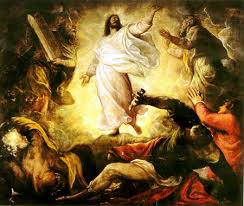 The Lord is risen indeed! Alleluia! Alleluia!
The Lord is risen indeed! Alleluia! Alleluia!
‘Alleluia’ is one expression that we hear so often during Easter. And when we hear a Catholic shouting out ‘Alleluia’ we think, they have become a Pentacostal. What does ‘alleluia’ mean? It simply means, ‘Praise the Lord’! But this praise is also filled with thanksgiving, joy and triumph. Several psalms begin and end with this expression. This is one of those expressions that has come to be used in Christian tradition in its original Hebrew expression, like ‘Amen’ and ‘Hosanna’. ‘Alleluia’ is an apt expression in the context of what we celebrate during Easter – it is simply to praise the lord for his triumph over death.
The Lord is risen indeed! Alleluia! Alleluia!
The celebration of Resurrection is the first feast that early Christians ever celebrated. In fact it was such a powerful event that they celebrated it every Sunday. Yes, even today… Sunday is the day of the Lord, the day of Resurrection. Belief in the Resurrection is central to Christian life. It is the event and experience of Easter that confirms our belief in Jesus as the Son of God, as it confirmed the belief of the apostles. St Paul tells us, “if Christ has not been raised, then our preaching is in vain and your faith is in vain” (1Cor 15:14).
Did Jesus really rise from the dead? No one saw Jesus rising from the dead, but from the after-experiences of the event we can offer 3 pointers to show that Jesus really rose from the dead:
1. The Empty Tomb: The first pointer for the resurrection of Jesus is the empty tomb. The new tomb in which Jesus was buried was found empty. It was a new tomb; hence there was no mix up of bodies. There were the Roman guards…even the Roman soldiers bore witness to the fact of the empty tomb (Mt 28). Besides, when the disciples were preaching about the Resurrection, no one brought as counter evidence the body parts or remains of Jesus, or even a tomb with someone’s body.
2. The Words of the Women: Despite their differences in details, all gospel narratives are agreed on the fact that women were the first witnesses of the resurrection of Jesus. As we know in the Semitic cultures, women’s words had no value, as may be is the case even up to this day in some cultures. So if the disciples were framing a big lie about the Resurrection of Jesus they would not say and even record that the women were the first witnesses of the Resurrection. The Resurrection event was an undeniable miracle that it could not be weakened by the words of the women.
3. The Transformation of the Disciples: We remember how the disciples and apostles were simple men, and had to hide behind closed doors after the death of Jesus. How did they suddenly come out preaching, even putting their lives at great risk? Acts of the Apostles is full of surprises. And these men were ready even to die for this truth that they proclaimed. There is no doubt that their experience of the Spirit of the Risen Lord, gave them that unshakable courage.
Someone can see all these pointers and not believe in the resurrection of Jesus. As in John 20:1-9. Peter and the Beloved disciple rushed to the tomb after hearing the news from Mary of Magdala. Both saw the signs of Resurrection… but Peter just saw (John 20:6-7) whereas “the other disciple, who reached the tomb first, also went in, and he saw and believed” (Jn 20:8). He believed.
Why is that so? Why is it that in spite of these pointers there were many people who couldn’t believe in the resurrection of Jesus. Even for many of the apostles initially it was not easy to believe. Belief in resurrection is possible when we can pass from a mere acceptance of the resurrection as an event, to it becoming an experience.
Yes, Easter is not a mere event. It is an experience. Let me explain myself. A few weeks back there was an earthquake and tsunami in Japan. This was an event for most of us. Perhaps we watched it on TV, or read about it the newspaper. But if you were there in Japan during the earth quake and tsunami, and may be lost your house… then it will not be just an event but an experience. An event becomes an experience when you are part of it. Events are happenings; but experiences are what you make out of them.
Some years back, I was spending a few days of personal prayer, one morning I was meditating on Chapter 21 of the Gospel of John. The Post-Easter stories brought to my thought an awareness that if Jesus is risen then he is alive; He is now here with me. This awareness suddenly elated me to a powerful feeling of the presence of Jesus over me, as if He had spread his mantle over me. So today… as I preach to you it is not an event that I am enumerating to you. But an experience that I am sharing with you.
My dear friends in Christ, so then let this Easter that we celebrate be not just an event – an historical event that happened 2000 years ago, or just a liturgical event. Let it be an experience for each one of us. We have fifty days – in this season of Easter – to savour this experience. Let the risen Lord become real to us. May we experience the outpouring of his spirit during this season! And this is the foundation of our Christian faith.
The Lord is risen indeed! Alleluia! Alleluia!